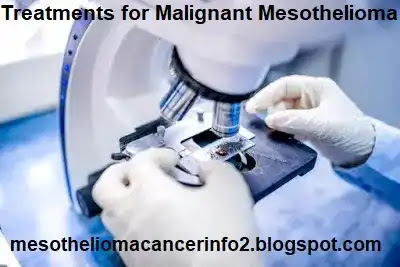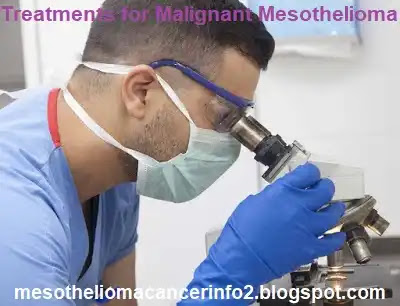Mesothelioma Treatment | Help Improve Your Prognosis
Emerging Treatments for Malignant Mesothelioma
The stage (extent) of a mesothelioma is an important factor in determining treatment options. But other factors, such as whether the doctor feels the cancer is resectable (all visible cancer can be removed by surgery), as well as a person’s general health and preferences, also play a role.
Mesotheliomas can be hard to treat, whether the cancer is resectable or not. It’s very important that you understand the goal of treatment before it starts whether it is to try to cure the cancer or to help relieve symptoms – as well as the possible benefits and risks. This can help you make an informed decision when looking at your treatment options
| mesothelioma guide |
Resectable mesotheliomas
In general, most stage I and some stage II and III pleural mesotheliomas are potentially resectable, but there are exceptions. Whether a tumor is resectable is also based on the subtype (most doctors don’t believe that sarcomatoid tumors are helped by resection), where it is in the body, how far it has grown into nearby tissues, and if the person is healthy enough to have surgery.
Many people with resectable pleural mesothelioma have their cancer removed by either pleurectomy/decortication (P/D) or extrapleural pneumonectomy (EPP). Surgery is more likely to result in long-term benefit in early stage cancers, where there is a better chance that most or all of the cancer can be removed. EPP might offer the best chance to remove the cancer, but it is a complex and extensive operation that is more likely to result in complications, and not all patients can tolerate it.
Patients with early-stage peritoneal mesotheliomas might also benefit from surgery that removes as much of the cancer as possible. This may be combined with heated intraperitoneal chemotherapy (HIPEC). Some patients have long remissions after this treatment. Surgery may also be helpful for some later-stage cancers, but the benefits are more likely to last only a short time.
Read Also: treatment options for mesotheliomaSometimes, the surgeon may think the cancer is resectable based on imaging tests (such as CT scans) done before surgery, but once the operation starts it becomes clear that not all of the cancer can be removed. In these cases the surgeon may switch to a less extensive operation like P/D (which is easier to tolerate) or even stop the surgery altogether if it’s not likely to be helpful. Treatment would then be the same as for unresectable mesotheliomas (see below).
Doctors are still studying whether giving chemotherapy (chemo) before surgery (neoadjuvant therapy) or giving chemo or radiation therapy after surgery (adjuvant therapy) is helpful, but not all doctors agree on the best course of treatment. Some doctors prefer to give chemo, either before or after surgery. Radiation therapy might be used after surgery, either alone or along with chemo.
If you are not healthy enough to have a major operation, you will be treated for unresectable mesothelioma (discussed below).Because these cancers can be hard to treat, taking part in a clinical trial of a newer form of treatment may be a reasonable option. These types of studies are usually done in large medical centers.
Unresectable mesotheliomas
Stage IV mesotheliomas, as well as many earlier-stage mesotheliomas, can’t be removed completely by surgery. This can be because of the extent or subtype of the cancer or because a person may not be healthy enough for an operation.
Chemo is the main treatment for these cancers. It may improve symptoms and shrink or slow the growth of the cancer for a time. Although chemo may help people live longer, it’s very unlikely to cure these cancers. Before starting treatment, the goals of treatment should be clear to you and your family.
In people with early-stage mesotheliomas that are likely to grow slowly and aren’t causing any symptoms, watching them closely at first may be a reasonable option. Treatment can then be started if there are signs that the cancer is growing quickly or if it starts to cause symptoms.
Because these cancers can be hard to treat, taking part in a clinical trial of a newer form of treatment may be a reasonable option.
Mesothelioma Survival Rates | Patient Survival and OutcomesIn many cases, treatment aimed at relieving symptoms and making you more comfortable may be a good choice. This could include treatments that prevent or reduce fluid buildup in the body, such as thoracentesis/paracentesis or pleurodesis (described in the section on palliative procedures). Sometimes pleurectomy/decortication can help with breathing and pain in the chest.
Pain management is another important aspect of care for these cancers. Some minor operations and types of radiation therapy can help relieve pain if needed. Doctors can also prescribe strong pain-relieving drugs. Some people with cancer are worried about taking opioid drugs (such as morphine) for fear of being sleepy all the time or becoming addicted to them. But many people get very effective pain relief from these medicines without serious side effects. It’s very important to let your cancer care team know if you are having pain so that it can be treated effectively.
Recurrent mesotheliomas
 |
| Emerging Treatments for Malignant Mesothelioma |
Cancer is called recurrent when it come backs after treatment. Recurrence can be local (in or near the same place it started) or distant (spread to organs such as the brain or liver). Mesotheliomas often come back after the initial treatment. If this happens, further treatment options depend on where the cancer is, what treatments have already been used, and a person’s general health.
In most cases the options will be similar to those listed above for unresectable mesotheliomas. For example, chemo or radiation therapy may be used to try to shrink or slow the growth of the cancer and to relieve any symptoms. Because recurrent cancers can often be hard to treat, clinical trials of new types of treatment may be a good option.


